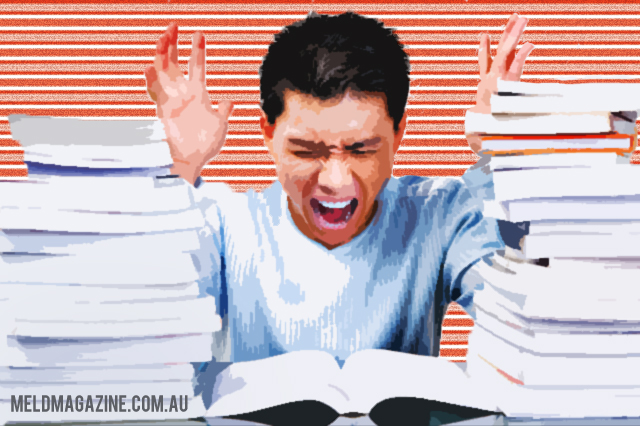Can Facebook, Twitter be blamed for bad grades?
KNOW of friends who have deactivated their social media accounts to concentrate on study? Rebecca Di Nuzzo shares some interesting findings and weighs in on whether Facebook and Twitter can be blamed for bad grades.
It has come.
That dreaded time of semester when assessments are due and exams are looming. Some students buckle under the pressure. Others thrive on the adrenalin of late nights and countless doses of caffeine.
Most of us, to varying degrees, will procrastinate, and for years now, social media has been the most highly criticised tool of procrastination among students.
Facebook, Twitter, Instagram, Pinterest, LinkedIn, the list goes on.
Does social media make you lazy and stupid?
According to Edward De Bono, a Maltese philosopher often hailed as the father of lateral and creative thinking, “there’s a danger in the internet and social media”.
Social media and cyberspace in general, he says, is making people lazy and stupid.
Does the man have a point?
TeachThought reports that every time a person stops work to check an IM, Facebook message or Tweet, it takes them 23 minutes to get back on task. And considering most messages are rarely once-off notifications and more often ongoing conversations, even a rough guess at combined productivity and time lost is phenomenal.
Using social media while studying can expose students to overwhelming amounts of stimuli…this could mean useless information is retained while other, possibly study essential facts fail to be absorbed.
Likewise, a study has found that using social media while studying can expose students to overwhelming amounts of stimuli.
Researchers say this could mean useless information is retained while other, possibly study essential facts fail to be absorbed.
“Human information processing is insufficient for attending to multiple input streams and performing simultaneous tasks,” the study’s authors Reynol Junco and Sheila R. Cotton writes.
So it turns out we may not be as good at multitasking as we thought. And we have all probably had experience with how easily five minutes on Facebook and Twitter turns into 30.
Are we all procrastinators, one way or another?
But can we honestly blame social media for our failures? Will deactivating our social media profiles really be the difference between a pass and distinction?
The resounding response from students (asked via a shout out on Facebook of course) was mixed.
While some blamed social media for their failures, labelling it a distraction, others found it a useful tool to de-stress and connect with friends while holed up with their textbooks.
Some even had the courage and admirable honesty to take responsibility for poor grades upon themselves.
Many students said while social media was a distraction from study, if it hadn’t been available they simply would have found another means of procrastination.
But here’s the clincher – many students said while social media was a distraction from study, if it hadn’t been available they simply would have found another means of procrastination.
In this sense it wasn’t so much Facebook or Twitter that were to blame for unproductive study sessions, but rather the student’s own lack of motivation.
Gasp!
Could it really be that we only have ourselves to blame when we find ourselves whiling away hours flicking through profile pics and trawling newsfeeds for status updates?
The answer could be a sad ‘yes’.

Social media is a tool, and social learning an action. The tool can facilitate the action, it just depends on how you use it.
Can social media have a positive impact on learning?
While a lot of criticism is aimed at social media and its effects on how students process information. The people at Blackboard Blogs donate a lot of time to exploring the way technology impacts education. They say the role of social media can have a positive effect on student learning.
In a publication that sets out to debunk four myths of social learning, the authors write that social media has the potential to facilitate learning by providing a readily accessible platform for collaboration. Or in other words, virtual study groups.
“The interconnected, interactive nature of social learning exponentially amplifies the rate at which critical content can be shared and questions can be answered,” they say.
They also say however, that social media has the potential to work both ways.
While it can motivate people to connect and share information online, it can just as easily provide a means of “wandering aimlessly” in cyberspace, discovering people and information that may serve little value or purpose.
It is for this reason that the head of learning and collaboration at Canadian firm Telus, Dan Pontefract, makes the distinction between social learning and social media.
Social media is a tool, and social learning an action. The tool can facilitate the action, it just depends on how you use it.
Mr Pontefract writes that social media is a tool, and social learning an action. The tool can facilitate the action, it just depends on how you use it.
So it turns out there could be a good case defending the merits of social media and study.
Confusing huh?
The valuable lesson that we can take away from this is social media is potentially a valuable asset to facilitate the communication of useful information. Or on the other hand it could be the method of your demise. It just depends how you use it.
Everyone studies differently, and usually by late high school and university level you have a fair idea of what works for you.
So if you need to take a deep breath and make the executive decision to temporarily disconnect, good on you for making that decision.
Don’t worry, all your Facebook friends, Twitter fans and LinkedIn connections will be waiting when you get back.
Has social media worked for you or against you when it comes to learning and study? Share with us in the comments section below.


